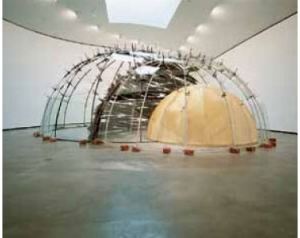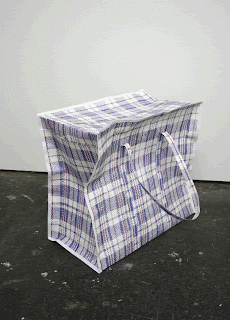'John Stezaker’s work re-examines the various relationships to the photographic image: as documentation of truth, purveyor of memory, and symbol of modern culture. In his collages, Stezaker appropriates images found in books, magazines, and postcards and uses them as ‘readymades’. Through his elegant juxtapositions, Stezaker adopts the content and contexts of the original images to convey his own witty and poignant meanings. In his Marriage series, Stezaker focuses on the concept of portraiture, both as art historical genre and public identity. Using publicity shots of classic film stars, Stezaker splices and overlaps famous faces, creating hybrid ‘icons’ that dissociate the familiar to create sensations of the uncanny. Coupling male and female identity into unified characters, Stezaker points to a disjointed harmony, where the irreconciliation of difference both complements and detracts from the whole. In his correlated images, personalities (and our idealisations of them) become ancillary and empty, rendered abject through their magnified flaws and struggle for visual dominance. In using stylistic images from Hollywood’s golden era, Stezaker both temporally and conceptually engages with his interest in Surrealism. Placed in contemporary context, his portraits retain their aura of glamour, whilst simultaneously operating as exotic ‘artefacts’ of an obsolete culture. Similar to the photos of ‘primitivism’ published in George Bataille’s Documents, Stezaker’s portraits celebrate the grotesque, rendering the romance with modernism equally compelling and perverse.' http://www.saatchi-gallery.co.uk/artists/john_stezaker.htm |
the pocket
Sunday, 2 October 2011
JOHN STEZAKER
Sunday, 11 September 2011
Tuesday, 6 September 2011
Monday, 5 September 2011
MARIO MERZ
'Through the igloo motif Merz explores the fundamentals of human existence: shelter, nourishment and humanity's relationship to nature. He examines the lost purity of pre-industrial societies as well as the changing, nomadic identity of modern man. Merz's igloos are comprised of diverse materials including the organic and the artificial, the opaque and the transparent, the heavy and the lightweight.' http://www.gagosian.com/exhibitions/britannia-street-2006-02-mario-merz/
Sunday, 4 September 2011
Anna King
'NESTS
Baskets - what are they? Traditionally thought of as utilitarian objects for containing, storing and transporting goods. They are also used ritualistically in what is considered to be the more primitive cultures - N & S America, Australia and Polynesia, for example.
NESTS - a theme I have been working with for the last few years. Many of the pieces I have made fit the context of the coiled basketry technique: enfolding, enclosing, protecting and sometimes even excluding. I have based this series on collected materials - feathers, felted wool and hair, shells and other ephemera. None of these decorative additions is arbitrary — they generally relate to walks and places I have visited: collected in the field, imbuing each basket with its own identity and sense of place.
My baskets are allowed to be whatever they want to be; what you see is what you want to see.'http://www.scottishbasketmakerscircle.org/annaking.html
Tuesday, 22 February 2011
Bianca Brunner
'With digital and 3D technology now the norm, can unaltered, analogue photographic prints still seduce, using only the basic perceptive trick of replicating a three-dimensional space in two dimensions? This small but well-chosen selection of photographs by Swiss-born artist Bianca Brunner pleasingly shows how they indeed can, simply by both representing and yet confusingly misrepresenting light, depth, solidity and surface.' time out
Susan Collis
One of my favourite artists
'Collis' practice involves a subversion of time frame and visual perception through the manipulation of everyday objects. In the piece 'Paint Job', what initially seems like a collection of careless splashes and stains upon the fabric of utilitarian worker's overalls are, on closer inspection, meticulously stitched marks replicating the accidental and spontaneous moment. Further to this, Collis enjoys playfully positioning the works in overlooked areas of an exhibition space, to heighten the potential for an initial misreading. We, the viewer, are then forced to rewire our visual and mental understanding of a particular mark, thus elegantly extending our viewing experience.'
Susan Collis represented by Seventeen Gallery-London
http://www.seventeengallery.com/index.php?p=2&id=16&iid=0
'Collis' practice involves a subversion of time frame and visual perception through the manipulation of everyday objects. In the piece 'Paint Job', what initially seems like a collection of careless splashes and stains upon the fabric of utilitarian worker's overalls are, on closer inspection, meticulously stitched marks replicating the accidental and spontaneous moment. Further to this, Collis enjoys playfully positioning the works in overlooked areas of an exhibition space, to heighten the potential for an initial misreading. We, the viewer, are then forced to rewire our visual and mental understanding of a particular mark, thus elegantly extending our viewing experience.'
Susan Collis represented by Seventeen Gallery-London
Rock bottom riser
2007
6 meters installed
Mother of pearl gemstones
Waltzer DETAIL
2007
127.5 x 37 x 11 cm
Wooden broom, opals, turquoise, garnets, seed pearls, mother of pearl, black diamonds, white diamonds, fresh water pearls, coral, black onyx, marcacite.
Tony Amore
2009
20 x 24 x 12 inches
Biro inks and pencil on paper construction
Made good (DETAIL)
Length 27 cm
Coral, black onyx, 18 carat white gold (hallmarked), diamond, silver. Edition of 10
http://www.seventeengallery.com/index.php?p=2&id=16&iid=0
pattern and paint
pattern/painting/techniques
Hugh Scott-Douglas
http://hughscottdouglas.com/index.php?/ongoing/work/
Bridget Riley
http://www.karstenschubert.com/browse/_Bridget%20Riley,21/
Gallery: http://www.karstenschubert.com/artists/
Subscribe to:
Comments (Atom)

















































